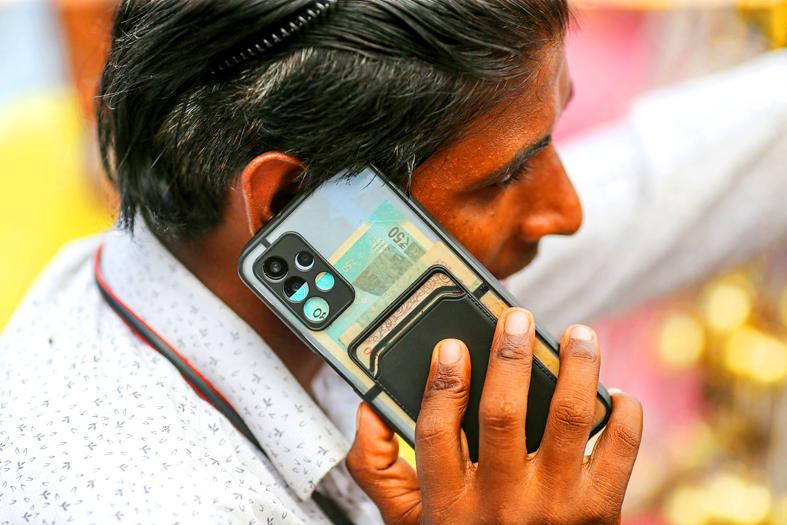India is seeking to restrict Chinese smartphone makers from selling devices cheaper than 12,000 rupees (US$151) to kickstart its faltering domestic industry, dealing a blow to brands including Xiaomi Corp (小米).
The move is aimed at pushing Chinese giants out of the lower segment of the world’s second-largest mobile market, people familiar with the matter said.
It coincides with mounting concerns about high-volume brands such as Realme Mobile Telecommunications Co (銳爾覓移動通信) and Transsion Holdings Co (傳音控股) undercutting local manufacturers, the sources said.

Photo: Bloomberg
Exclusion from India’s entry-level market would hurt Xiaomi and its peers, which in recent years have increasingly relied on India to drive growth while their home market endures a series of COVID-19 lockdowns that crippled consumption.
Smartphones under US$150 contributed to a third of India’s sales volume for the quarter through June this year, with Chinese companies accounting for up to 80 percent of those shipments, according to market tracker Counterpoint.
It is unclear whether Indian Prime Minister Narendra Modi’s government plans to draft any policies or use informal channels to convey its preference to Chinese companies, the people said.
New Delhi has subjected Chinese firms operating in the country — such as Xiaomi, Oppo Mobile Telecommunications Corp (歐珀) and Vivo Communication Technology Co (維沃) — to close scrutiny of their finances, which has led to tax demands and money laundering allegations.
The government has previously employed unofficial means to ban Huawei Technologies Co (華為) and ZTE Corp (中興通訊) telecom equipment. While there is no official policy prohibiting Chinese networking gear, wireless carriers are encouraged to purchase alternatives.
The move should not affect Apple Inc or Samsung Electronics Co, which price their phones higher.
India increased pressure on Chinese firms in the summer of 2020 after more than a dozen Indian soldiers died following a clash on a disputed Himalayan border. It has since banned more than 300 apps, including Tencent Holdings Ltd’s (騰訊) WeChat and ByteDance Ltd’s (字節跳動) TikTok.
Homegrown companies such as Lava International Ltd and MicroMax Informatics Ltd comprised just under half of India’s smartphone sales before new entrants from the neighboring country disrupted the market with cheap and feature-rich devices.
Chinese smartphone players now sell the vast majority of devices in India, but their market dominance has not been “on the basis of free and fair competition,” Indian Minister of State for Electronics and Information Technology Rajeev Chandrasekhar said in an interview last week.
Recurring annual losses posted by most Chinese handset makers in India add to criticism of unfair competition, despite their leading position,
In private, the government continues to ask Chinese executives to build local supply chains and distribution networks while exporting from India, suggesting that New Delhi still desires their investment, the people said.

Greek tourism student Katerina quit within a month of starting work at a five-star hotel in Halkidiki, one of the country’s top destinations, because she said conditions were so dire. Beyond the bad pay, the 22-year-old said that her working and living conditions were “miserable and unacceptable.” Millions holiday in Greece every year, but its vital tourism industry is finding it harder and harder to recruit Greeks to look after them. “I was asked to work in any department of the hotel where there was a need, from service to cleaning,” said Katerina, a tourism and marketing student, who would

i Gasoline and diesel prices at fuel stations are this week to rise NT$0.1 per liter, as tensions in the Middle East pushed crude oil prices higher last week, CPC Corp, Taiwan (台灣中油) and Formosa Petrochemical Corp (台塑石化) said yesterday. International crude oil prices last week rose for the third consecutive week due to an escalating conflict between Israel and Iran, as the market is concerned that the situation in the Middle East might affect crude oil supply, CPC and Formosa said in separate statements. Front-month Brent crude oil futures — the international oil benchmark — rose 3.75 percent to settle at US$77.01

Merida Industry Co (美利達) has seen signs of recovery in the US and European markets this year, as customers are gradually depleting their inventories, the bicycle maker told shareholders yesterday. Given robust growth in new orders at its Taiwanese factory, coupled with its subsidiaries’ improving performance, Merida said it remains confident about the bicycle market’s prospects and expects steady growth in its core business this year. CAUTION ON CHINA However, the company must handle the Chinese market with great caution, as sales of road bikes there have declined significantly, affecting its revenue and profitability, Merida said in a statement, adding that it would

UNCERTAINTIES: The world’s biggest chip packager and tester is closely monitoring the US’ tariff policy before making any capacity adjustments, a company official said ASE Technology Holding Inc (日月光投控), the world’s biggest chip packager and tester, yesterday said it is cautiously evaluating new advanced packaging capacity expansion in the US in response to customers’ requests amid uncertainties about the US’ tariff policy. Compared with its semiconductor peers, ASE has been relatively prudent about building new capacity in the US. However, the company is adjusting its global manufacturing footprint expansion after US President Donald Trump announced “reciprocal” tariffs in April, and new import duties targeting semiconductors and other items that are vital to national security. ASE subsidiary Siliconware Precision Industries Co (SPIL, 矽品精密) is participating in Nvidia